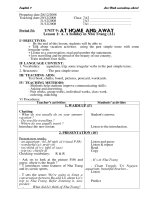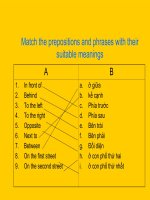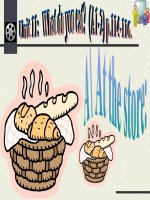A1 BDA a5879 DF b0 f75 b4 a85 c33 d58
Bạn đang xem bản rút gọn của tài liệu. Xem và tải ngay bản đầy đủ của tài liệu tại đây (24.07 KB, 3 trang )
108
Appendix 1
CAD/CAM (ComputerAssisted Design±ComputerAssisted Manufacturing)
As stated before, this book is not about the actual technique of designing
(delineating) molds, but about the logic and reasons behind a successful mold
design and the questions the designer must consider and answer at every step of
the design process. Computers now play an important part in this process,
especially if there are many precedents accessible to the designer to be used for
new designs and if there is a large collection of standards that can be accessed
from computer memories without the need for tediously drawing and redrawing,
from simple parts to complicated subassemblies. Also, by using special
programs, many calculations can be performed rapidly and accurately, and
newly created mold designs can be easily checked for ef®ciency of plastics ¯ow,
cooling, strength of materials, cam motions, and so on.
Because there are so many design programs, the designer usually starts by
redrawing the customer's information, which may have been submitted as hard
copy (prints) or electronically, but originating from a different system than the
one used by the designer. Once the to be molded part (the product) is drawn and
dimensioned to the designer's shop rules, a program will be used to add the mold
shrinkage to established rules. A constant factor may be used for the product, or
different shrinkages may be applicable, as explained earlier in this book.
The designer will now go through the motions as explained earlier, either
designing ``from scratch,'' or searching the ®les for a suitable precedent. If a
good precedent is found, it can now be merged with the new product drawing
and the mold can be designed. Once completed in principle, various programs
can be used to check selected areas (plates, cavities, etc.) for physical strength
and to check with other programs the expected ef®ciency of ®lling the mold
cavities, gate location and sizes, runner sizes, the cooling layout, and so on. Note
that all results from using these programs depend on the accuracy of the data
CAD/CAM (Computer-Assisted Design±Computer-Assisted Manufacturing)
109
provided, such as reasonable assumptions as to temperatures, pressures, times,
and so on.
Once the mold drawings are ®nished, they are transferred to the
manufacturing group. By using related, compatible CAM programs, which are
often developed in-house, and the input of experienced machinist/programmers,
the manufacturing group will determine the best tools to use for the selected
machine tools and the appropriate tool paths for each mold part for each tool and
for each machine tool.
The following is a list of better known and widely used CAD and CAM
programs.
CAD/CAM Programs
Autocad, Autodesk Canada Inc. (mostly for PCs)
90 Allstate Parkway, Suite 201, Markham, ON, Canada L3R 6H3
905-946-0928
Unigraphics, Unigraphics Solutions
2550 Matheson Blvd., Mississauga, ON, Canada L4W 4Z1
905-212-4500
Proengineer, Parametric Technologies Co.
128 Technology Dr., Waltham, MA 02453, USA
781-398-5000
Fluid Flow Programs
CADMOULD, Simcon Inc. (mold¯ow, cooling, shrinking and warpage)
10914 N 39th. St., Suite B-4, Vancouver, WA 98682
888-754-8628
MOLDFLOW, Mold¯ow Corp. (mold ¯ow, cooling)
91 Hartwell Ave., Lexington, MA 02421, USA
781-674-0085
FEMAP Enterprise (¯uid ¯ow, all ¯uids)
PO 1172, Exton, PA 19341, USA
610-458-3660
110
CAD/CAM (Computer-Assisted Design±Computer-Assisted Manufacturing)
FIDAP, SPRC (¯uid ¯ow)
1155 North Service Rd., Suite 11, Oakville, ON, Canada L6M 3E3
905-465-1733
(partner for Fluid Dynamics International, 708-491-0200)
Mechanical Stresses
ANSIS Mechanical Dynamics Ltd.
400 Carlingview Dr. Toronto, ON, Canada M9W 5X9
416-674-2144
AL GOR
150 Beta Dr., Pittsburg, PA 15288, USA
412-967-2700









